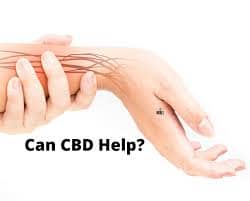Can you use CBD topicals for nerve damage? Before we go any further, let’s talk about the purpose of nerves. Without functioning nerves, our bodies are in a world of hurt. They do so much, from regulating breathing to sensing heat or cold or controlling muscle response.
There are three types of nerves in the body:
- Autonomic nerves control the involuntary or partially voluntary activities of your body, including heart rate, blood pressure, digestion and temperature regulation.
- Motor nerves control your movements and actions by passing information from your brain and spinal cord to your muscles.
- Sensory nerves relay information from your skin and muscles back to your spinal cord and brain. That information is processed so you feel pain and other sensations.
Damage to any one of these nerves can make daily living a challenge. With more than 100 types of nerve damage, you can experience multiple symptoms and require different treatment. For that reason, I’ll look at just two kinds of nerve damage: sciatica and carpal tunnel syndrome.
But first, let’s talk about the distinction between nerve pain and neuropathy, often used interchangeably in medical texts and elsewhere.
Nerve pain or neuropathy?
There is a difference is between nerve pain and neuropathy, but the distinction often blurs. So, here is the Cliff’s notes version.
Nerve pain is damage or injury to a nerve that can cause symptoms such as pain, numbness or prickling sensations in areas of the body.
Neuropathy is damage to the nerves in the central nervous system with damage to nerve fibers, disrupting the pain signals the nerves send to and receive from other parts of the body.
Peripheral neuropathy is a problem with nerves that send messages from the central nervous system, the brain and the spinal cord to the rest of the body.
CBD topicals for nerve damage
For the moment, let’s concentrate on nerve pain. I’ve already noted that CBD topicals are safer than other pain relievers. So, if you’re open to experimenting, CBD topicals may be a good choice for nerve pain. Damaged nerves can do two things. One, they may send false signals making you feel pain when there isn’t a reason. Two, you may not feel pain when you do have an injury. Essentially, nerve damage can interfere with numerous daily activities and topical CBD may help restore balance.
Numerous studies show that hemp-infused CBD topical for nerve damage lowers the intensity of pain safely. Two studies by the National Institutes of Health show its efficacy in pain that hadn’t responded to other more mainstream products, as well as pain associated with multiple sclerosis. When pain is relieved, people with chronic pain have:
- Improved sleep quality
- Less depression and anxiety
Now let’s talk sciatica and carpal tunnel. But first, I want to emphasize that CBD topicals have no known side effects, which is not the case for many over-the-counter treatments for nerve pain. You can use it as often as you need without concern about side effects or addiction. Plus, CBD is nonpsychoactive so you won’t get you high.
CBD and sciatica
The sciatic nerve runs through your body starting in the lower back and moves down the hips and buttocks through the back of your leg. This nerve is about the thickness of your pinky finger and when it lights up with pain, you know it.
Sciatica occurs when the nerve is compressed because of a herniated disk, bone spurs or narrowing of the spine. The resulting inflammation and pain can radiate down your leg. In severe cases, you may lose leg strength or bowel or bladder control. Then, surgery may be necessary.
CBD is an anti-inflammatory and inflammation is the root of sciatica. Most often, rather than CBD, doctors prescribe paracetemol or ibuprofen, nonsteroidal anti-inflammatory drugs (NSAIDs). However, they often fall short of being effective, at which point doctors prescribe Pregabalin, Gabapentin, Naproxen or Codeine. But even though some relief can be realized with them, it comes at a cost. Side effects from these products can include fatigue, visual issues, memory loss and depression to name a few. Other medications such opioids, are addictive.
CBD and carpal tunnel
The median nerve runs down your arm and into your hand. It can be compressed by a ligament that crosses over it as it passes through a narrow space in the wrist known as the carpal tunnel, you’ll feel tingling or numbness in your fingers. At first it comes and goes. Eventually, it may last longer, and you can lose your ability to grip objects.
Also an inflammation, carpal tunnel syndrome is often treated with NSAIDS. Like sciatica, CBD topicals applied directly to the affected area can help relieve the intense pain, tingling and burning sensation in the fingers.
CBD’s anti-inflammatory and analgesic properties go directly to the affecte d area, bypassing the bloodstream to ease inflammation and pain.
d area, bypassing the bloodstream to ease inflammation and pain.
CBD does not cure sciatica or carpal tunnel syndrome, but it can help relieve the symptoms caused by inflammation. A 2016 research report in FASEB Journal claims, “Cannabinoids apparently act on inflammation through mechanisms different from those of agents such as NSAIDs. As a class, the cannabinoids are generally free from the adverse effects associated with NSAIDs.”
Unlike NSAIDs and other medications that build up a tolerance in your body requiring stronger drugs, CBD topicals are a natural remedy for soft tissue and nerve pain.
